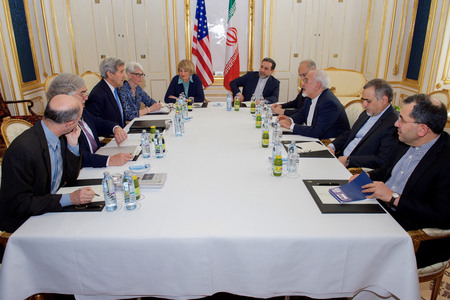Co-authored by Erica Fein, WAND Nuclear Weapons Policy Director
As negotiations to achieve a lasting nuclear agreement between Iran and six international powers (known as the P5+1) continue for another week, it is worth remembering what the options are. Spoiler alert: There is no better deal, and calls to achieve one risk leading the United States and Iran back on a path to war.
While promoters of peace and diplomacy are sometimes criticized for being overly idealist, when it comes to the Iran negotiations, this notion doesn't hold water. On the contrary, hawkish politicians, observers, and advocates are the ones living in a fantasy land.
Diplomacy critics like Israeli Prime Minister Benjamin Netanyahu or Senator Tom Cotton (R-AR) say the United States and its partners should be holding out for more. In his March speech to Congress, for instance, Mr. Netanyahu said that, "The alternative to this bad deal is a much better deal."
Gary Sick of Columbia University and Jeffrey Lewis of the James Martin Center label this the "unicorn" option, because it only exists in an alternate universe. The unicorn option posits that more pressure on Iran would force the Iranians to capitulate. A better deal would force Iran to dismantle its entire nuclear infrastructure and live forever under the existing unprecedented monitoring and verification requirements; in short, terms that no sovereign nation would deign agree to.
Iran has in fact met its key obligations under the interim agreement signed in November 2013, including reducing its stockpile of uranium to below a cap of 7.6 metric tons and converting it into a form that makes it difficult to reconvert for use in nuclear weapons. It has stopped construction on its plutonium production facility, allowed intrusive inspections of its nuclear sites, and agreed to dismantle two-thirds of its centrifuges and limit research on advanced nuclear technology. Since Iran continues to live up to its end of the bargain, it is not hard to see how more sanctions pressure now would drive Iran away from the table, rather than lead to concessions.
Members of Congress seeking the unicorn option risk undermining the unity of the P5+1 and the entire sanctions regime. As Britain's chief negotiator Ambassador Peter Westmacott said, "[I]f the Congress was to make it impossible for the agreement to be implemented...then I think the international community would be pretty reluctant, frankly, to contemplate a ratcheting up further of the sanctions against Iran."
In other words, the sanctions regime, held together by some begrudging international partners including India, Japan, South Korea and China, would likely not survive a scenario where the United States is faulted for a breakdown in negotiations. Yet, congressional intervention that would undermine the U.S. position is a very real possibility.
In fact, Congress has set up a process by which, shortly after a deal is completed, it can take up legislation to disapprove of that deal. It can also prevent the Obama administration from lifting sanctions. Doing so threatens, in a very real way, to undo all of the progress that has been made over the last two years of negotiations. It could be a spark that unravels the sanctions regime, provokes Iran to double down on its nuclear program, and ultimately escalates the situation to a crisis, leading to calls for war on Iran.
Too much idealism in foreign policy often leads to bad policy-making. Think of the attempt to play hardball by 47 Republican Senators, who sent a much criticized open letter to the Iranian regime threatening to undo a future deal after President Obama's term is over.
Many of these same Republicans, in addition to some Democrats, could soon vote to scuttle a nuclear deal, on the premise that there is a better one out there. But the unicorn option doesn't exist in this universe, and hoping for it could lead us into a very dangerous, but avoidable, reality. Allowing the United States to continue the negotiations is the only realistic course to pursue.
[Image Credit: U.S. Department of State; Secretary Kerry, Iranian Foreign Minister Zarif and Respective Teams Sit Together Amid Iranian Nuclear Program Negotiations in Austria, July 2015. This image is a U.S. government work and as such is in the public domain.]
